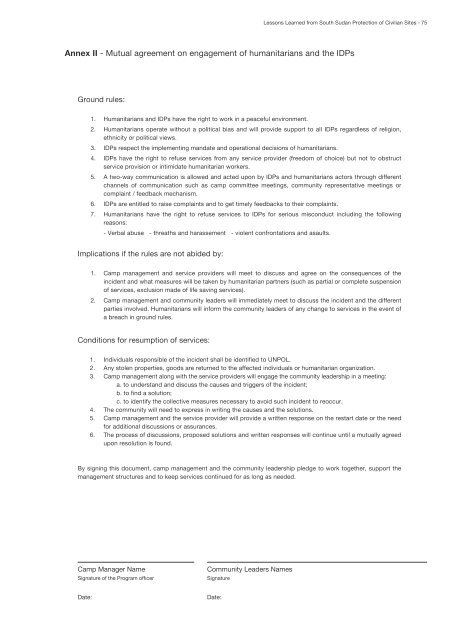Lessons Learned from South Sudan Protection of Civilian Sites 2013–2016
if_we_leave_0
if_we_leave_0
You also want an ePaper? Increase the reach of your titles
YUMPU automatically turns print PDFs into web optimized ePapers that Google loves.
<strong>Lessons</strong> <strong>Learned</strong> <strong>from</strong> <strong>South</strong> <strong>Sudan</strong> <strong>Protection</strong> <strong>of</strong> <strong>Civilian</strong> <strong>Sites</strong> - 75<br />
Annex II - Mutual agreement on engagement <strong>of</strong> humanitarians and the IDPs<br />
Ground rules:<br />
1. Humanitarians and IDPs have the right to work in a peaceful environment.<br />
2. Humanitarians operate without a political bias and will provide support to all IDPs regardless <strong>of</strong> religion,<br />
ethnicity or political views.<br />
3. IDPs respect the implementing mandate and operational decisions <strong>of</strong> humanitarians.<br />
4. IDPs have the right to refuse services <strong>from</strong> any service provider (freedom <strong>of</strong> choice) but not to obstruct<br />
service provision or intimidate humanitarian workers.<br />
5. A two-way communication is allowed and acted upon by IDPs and humanitarians actors through different<br />
channels <strong>of</strong> communication such as camp committee meetings, community representative meetings or<br />
complaint / feedback mechanism.<br />
6. IDPs are entitled to raise complaints and to get timely feedbacks to their complaints.<br />
7. Humanitarians have the right to refuse services to IDPs for serious misconduct including the following<br />
reasons:<br />
- Verbal abuse - threaths and harassement - violent confrontations and asaults.<br />
Implications if the rules are not abided by:<br />
1. Camp management and service providers will meet to discuss and agree on the consequences <strong>of</strong> the<br />
incident and what measures will be taken by humanitarian partners (such as partial or complete suspension<br />
<strong>of</strong> services, exclusion made <strong>of</strong> life saving services).<br />
2. Camp management and community leaders will immediately meet to discuss the incident and the different<br />
parties involved. Humanitarians will inform the community leaders <strong>of</strong> any change to services in the event <strong>of</strong><br />
a breach in ground rules.<br />
Conditions for resumption <strong>of</strong> services:<br />
1. Individuals responsible <strong>of</strong> the incident shall be identified to UNPOL.<br />
2. Any stolen properties, goods are returned to the affected individuals or humanitarian organization.<br />
3. Camp management along with the service providers will engage the community leadership in a meeting:<br />
a. to understand and discuss the causes and triggers <strong>of</strong> the incident;<br />
b. to find a solution;<br />
c. to identify the collective measures necessary to avoid such incident to reoccur.<br />
4. The community will need to express in writing the causes and the solutions.<br />
5. Camp management and the service provider will provide a written response on the restart date or the need<br />
for additional discussions or assurances.<br />
6. The process <strong>of</strong> discussions, proposed solutions and written responses will continue until a mutually agreed<br />
upon resolution is found.<br />
By signing this document, camp management and the community leadership pledge to work together, support the<br />
management structures and to keep services continued for as long as needed.<br />
Camp Manager Name<br />
Signature <strong>of</strong> the Program <strong>of</strong>ficer<br />
Community Leaders Names<br />
Signature<br />
Date:<br />
Date:


